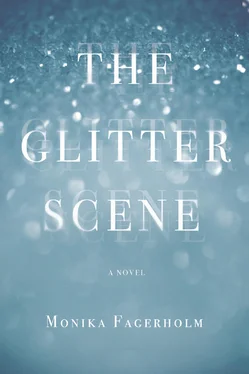“Look, Miss Andrews!” Rita says suddenly. We see the baroness from a distance. On the cliffs, by the sea. And the house, with the large veranda with the windows that can swing open toward the sea when it’s really warm. Her Winter Garden, which she had talked about once. Welcome girls to my lovely garden. That’s just something you say, it never happens. The swimming and the English at Bule Marsh are, so to speak, for the baroness, games, another place. I know that better than my sister Rita.
“What now?” I ask because I don’t want Rita to become disappointed.
Rita doesn’t say anything. But she gets angry at me, you can see that.
But otherwise it’s nice up there, you can see in many directions. The coast, the sea, the houses, the woods. Everything is there. Being here.
On that July evening with my twin sister, Rita, it’s not the stone foundation, here we belong together. And of course, naturally in some way waiting for the cousin’s mama to come out on the steps of the cousin’s house below the hill and call us home for supper.
“Come, all my boys!” she calls, but all of the girls are included too, of course. Me and Rita, Rita, me.
And all of the boys come. Björn and Bengt from their directions, often together. From the barn, for example, where they have been lurking with the American girl, the three of them. Carrying out lengthy, quite normal teenage conversations that don’t say much of anything. Because normal teenagers in full possession of their senses don’t stand there and hold speeches for each other.
In other words Bengt, then, as said, the one who has been keeping the group alive.
“  .”
.”
Says something in ancient Greek.
In order to impress the American girl. Teach Yourself Ancient Greek . Since she has a book like that and has lent it to him.
But the cousin’s mama who calls and the boys, separate from the girls, to the supper table, all four kids together.
•
“Wait for meee!”
But then one evening, another hungry, thirsty one shows up on the road. Doris Flinkenberg, the knocked-about kid, who becomes, for a while, “the fifth duckling at the table.” That’s how Doris expresses it herself, when the cousin’s mama quickly sets out a teacup and a plate for her too.
The strange, wonderful, but poor little Doris Flinkenberg.
That it’s a shame about Doris, everyone knows that. Doris, from the Outer Marsh, who wanders around in different places because she has a hard time at home, seeks out calmer places to be. Places where she can rest. So tired. How Doris slumps together after tea and sandwiches, falls asleep in her chair.
But in the middle of her deep sleep, watchful. On the alert at the slightest foreign sound, movement. Her eyes open, wide-open.
Looks around: the danger, the threat, where?
And then it’s just something ordinary. For example the cousin’s mama who turned on the transistor radio, which Björn had brought with him, when everyone had finished eating.
The pop music floods through the kitchen.
Doris immediately relaxes and starts singing along with the song, even though she doesn’t master either the lyrics or the melody. The cousin’s mama who, in contrast to everyone else in the kitchen, knows the song, joins in: Doris raises a cry, the cousin’s mama raises a cry—and in the middle of the song, how Doris looks at the cousin’s mama with teacup saucer eyes as if at a creature from an unknown planet. Like mother, like song . Is it possible?
Delightful new acquaintance.
And Doris, still in the song, slides off the chair and steps out on the floor and onto her toes and starts dancing. Silly, in and of itself, Doris can’t dance after all. But she dances anyway, bumpily, because she is also rather small and plump too. And how the cousin’s mama, while the song is playing, sings, Doris dances, looks at Doris so, tears in her eyes but so happy. Doris-light!
And Doris: you can see how a wonderful view unfolds in those eyes. In the middle of the Doris-song, Dorisdance, rosy cheeked, loud voice, and—marsh cunningness. A small glitter; but you can’t say it in Doriscontexts, it sounds so awful.
Afterward, Doris comes to the cousin’s house more and more often. Almost every day. Is drawn to the cousin’s mama, the cousin’s house like a magnet.
Starts staying the night as well. Not in the cousin’s house; it isn’t possible because of the cousin’s papa. But, for example, with me and Rita in the middle of the room between our sleeping bags, you have to, says the cousin’s mama of course, “have pity.” Lets herself be found in different places nearby. Out in the barn, up in the house on the First Cape where she, despite the fact that all the doors are locked, easily makes her way in.
But at the same time: it’s a terrible shame about Doris.
But always, if she doesn’t go herself, she is taken away anyway. The cousin’s papa is angry, eventually he even calls the police and says that they should come and take the child away. The cousin’s mama is crying. Doris is crying. Even tries, when she sees how sad the cousin’s mama is, not to show her own sadness. Brave girl, brave Doris!
Doris who is taken away, Doris who comes back. The cousin’s mama who snaps—
The cousin’s mama who goes to the cousin’s papa.
•
He likes that, the cousin’s mama doesn’t know that, she doesn’t know him. That the more she asks and asks, the worse it becomes. She is countryman Loman’s daughter and knows this sort of thing can be arranged, the child must be looked after, and it has always been the case that all children should come to her! Astrid Loman, “children’s mama.”
But it is so that the cousin’s mama is no daughter anymore and this is not the neighboring municipality, which he, in various ways, explains to her. Loves explaining to her, the more persistent she is with him. It’s terrible to see because it’s quite likely, or I’m sure of it, that the cousin’s papa would, if Doris just came to the house and stayed in the house without there being a big fuss about it in that way, even like it. Wouldn’t have anything against Doris, actually, but now, here, with Astrid Loman, the countryman’s daughter, he sees the opportunity to play a game. He likes games like these, give with one hand, take with the other, have an opponent whom he always makes sure is at a slight disadvantage, floating around in uncertainty. Uncertainty, obscure promises that he takes back, only to make the same promises again the next moment, or even just fulfill the promise suddenly when you’ve just stopped hoping.
Negotiate the matter, it costs money. Which means that the cousin’s papa, for fun, names a sum of money that he claims he has seriously calculated it would cost to take care of a girl like Doris until she becomes an adult, including the money to pay off the people in the Outer Marsh and so on. If she gives him that sum of money, to be delivered by hand, he might possibly take the matter seriously under consideration. Not even rotten eggs are free, the cousin’s papa repeats. Rotten egg is the cousin’s papa’s nickname for Doris Flinkenberg. Comes from Doris herself, actually: how Doris has a habit of imitating the cousin’s papa’s way of saying the word, which he often says anyway, in general so to speak, in relation to everything and everyone, but the cousin’s papa imitates Doris only when she isn’t around.
Something in Doris makes it so that when Doris is in the cousin’s house the cousin’s papa stays out of sight. But Doris is also good at noticing things; all of her senses on alert, observant.
The cousin’s papa names this sum and the cousin’s mama believes him. Aastriid. A ray of hope lights up in Astrid’s eyes. At closer reflection: is extinguished again. Cannot give in. Is lit.
Читать дальше

 .”
.”









